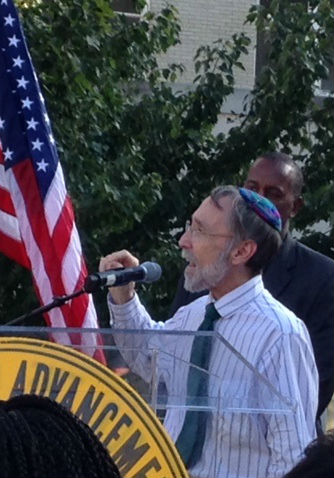On the heels of the great sin of Israel–worshipping an oversized molten calf while Moses took “so long coming down from the mountain” (Exodus 32)–Moses implores God not to desert the Israelites. “See, You tell me, ‘lead this people forward’ but you have not told me whom You will send with me. If You Yourself are not going, do not make us leave this place!”
Moses is right to be concerned. He does not want to leave without the assurance that God will be at the head of the people. Considering the ordeal of the calf, Moses has a right to fear.
One reason for Moses to fret comes at the end of Chapter 33. There, Moses beseeches God to “let me see your glory”; to view God’s physical self. After a brief negotiation, God gives Moses a final offer, “All My Goodness I will cause to pass before you, and I will proclaim the name ‘Adonai’…”
God tips Moses’ hand. Moses is concerned that without the presence of God’s Tov, the march to a new land will not only be impossible but pointless. He surmises that without the Eternal’s model of righteousness, his former slaves will never grasp the lofty and difficult ambition to establish a nation of justice.
In a narrow sense, God’s role as model of righteousness might be easier than that of a mortal rabbi. God does not have to be reappointed at the end of a contract. God does not worry about losing the support of a board member, or whether the heavenly gates need repair, or if a large infusion of kesef is needed to replace the roof on the yeshiva shel maalah.
The reality for modern rabbis? The material requirements of our missions potentially rely upon our pleasing our people and they may well prefer that we continue going along with the molten calf program. “Don’t preach politics, Rabbi.” (Read this as, “Don’t stand for anything controversial, Rabbi.”)
When we decide that, whatever the cost, we cannot remain silent when a one-and-a-half year-old Palestinian infant is burned to death, his father and mother killed, and his older brother seriously wounded because their West Bank home is set on fire by Settler extremists, our sermon or letter is probably going to feel controversial to some group of our members.
When we mention that the federal minimum wage has not been raised in five years even though increases in the minimum wage have had little or no negative effect on the employment of minimum-wage workers, I can guarantee you that someone from the molten calf committee will not be happy.
Listen to Rabbi Stephen Wise reflecting on his fears in 1919 before addressing his Free Synagogue Congregation about the rights of laborers. “I know that some of the members might refuse to lend their help in the building of the synagogue home as a result of what I was about to say but also again made clear that, while it might not be necessary for them to build a synagogue, it was necessary for me to speak the truth.” (Challenging Years, p. 68) Wise’s congregants, many of them captains of industry, built Wise’s synagogue, af al pi chen. And no one forgot his words that day.
Our people may have forgotten that they did not hire us to mimic their own opinions. We became their rabbis to help them lead more Jewish lives. Let us use every occasion to cause ‘kol tuvi,’ God’s goodness and justice, to pass before them.
John S. Friedman recently retired from 35 years as rabbi of Judea Reform Congregation in Durham, NC. In May, 2015, T’ruah honored him with its Human Rights Hero Award.

